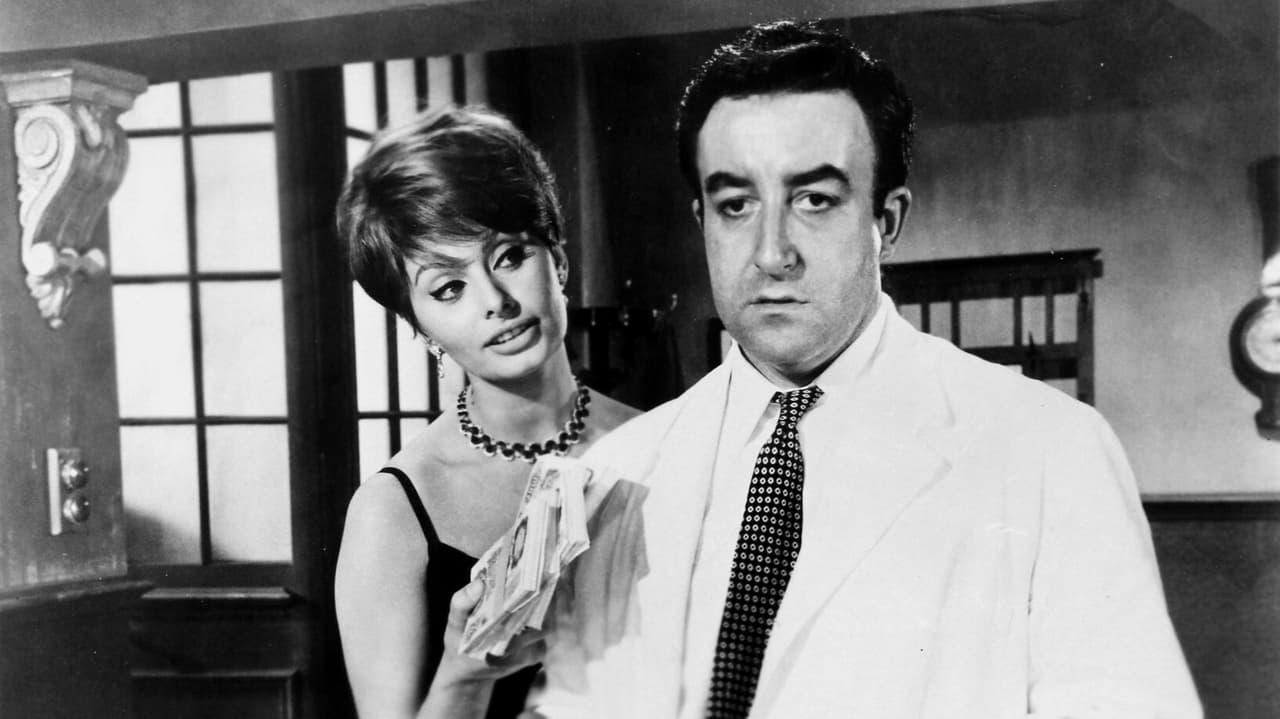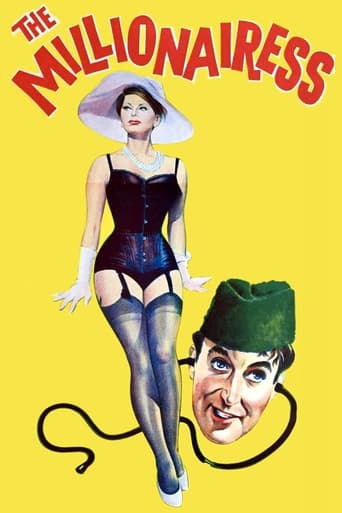

It's fun, it's light, [but] it has a hard time when its tries to get heavy.
... View MoreThis movie was so-so. It had it's moments, but wasn't the greatest.
... View MoreExcellent and certainly provocative... If nothing else, the film is a real conversation starter.
... View MoreThe thing I enjoyed most about the film is the fact that it doesn't shy away from being a super-sized-cliche;
... View MoreYes, it's true that there is no real chemistry here between the stars: Sellers never had any and Sophia always had too much. Every once and awhile the wit of G.B. Shaw's original play sneaks through this unfortunate 1960's modernization. "Puffin" Asquith's rather fey direction doesn't help much. And yet, there are some added attractions here that go beyond the usual rules of the cinema art. For one, the young Sophia was never more luscious -she's the blooming flower of Italia, as tasty as the mozzarella of Napoli, a veritable Mount Vesuvius overflowing with girlish charm, and, as she spends a great deal of time in this film in various stages of undress, some wet and most dry, there is much to look at here beyond Jack Hildyard's photography, Balmain's clothes and Paul Sheriff's elaborate studio sets. Not for Shavians or Fabians but definitely for connoisseurs of feminine pulchritude. Bo Derek might be a 10, but Sophia is cento per cento!
... View MoreThis film works very well, IMO, on the level of pure entertainment. There are many elements to be enjoyed.It is not a film in which one is swept away by the story and the characters. It's a film you watch with a certain detachment and never really suspend disbelief.But there is a lot of fun to be had in the amused detachment. A lot of the dialogue is really hilarious. That alone would have made it worth sitting through. But on top of that there is the way Peter Sellars interprets his particular character. The body language he brings to it and some of the nuances in his schtick are both intriguing and highly entertaining to observe.Then there is the stunning beauty of Sophia Loren which is further enhanced by a steady stream of wardrobe changes, each more spectacular than the one before.And then there is the parallel running commentary you can have in your own thoughts about how the movie plot line brings to mind some possible similarities that there may have been in the real-life relationship Princess Diana had with her very own Indian doctor, Dr. Khan, said by some to have been the love of her life.Again, a lot to enjoy about this film and well worth seeing, JMO.
... View MoreI've never read the GBS play this is supposedly based on, but I'm sure it had to be better than this movie adaptation. Shaw's influence is evident in the emphasis on class warfare and the evils of capitalists. But the silly plot in which these ideas are presented is tedious and slow- moving.If you read a capsule summary of THE MILLIONAIRESS, you get the impression that it's somehow about a contest between a man and a woman, trying to fulfill the terms of various wills so they can be married. But the actual contest doesn't really come into focus until the movie is more than half over. Before that, it just grinds its gears, showing us how petulant and greedy Sophia Loren's character can be, and how pure and honorable Peter Sellers' Indian doctor can be. Her interest in him doesn't make much sense, and neither does his rejection of her advances. The abrupt ending leaves you wondering if a reel or two have been left out unintentionally. Peter Sellers and Sophia Loren (looking so young and radiant) are always fun to watch. Just imagine what a great comedy they COULD have made if a good screenwriter had developed a proper vehicle for them. Watching them work is the only thing that makes this movie bearable. Great comic actors like Alfie Bass and Alastair Sim are wasted in parts that barely allow them to stretch (although we do get a couple of Sim's trademark giggles). Besides all this, the film looks cheap. The sets are bare-bones; some looking like painted backgrounds from a school play. The scene where they visit the new hospital and Sellers raves about the equipment is a joke in itself: would he really be impressed by a couple of lab tables with a few test tubes and what looks like a Victorian microscope?This film is only for Sellers and/or Loren fans who insist on seeing everything they ever did. Those who are seeking entertainment should look elsewhere.
... View MoreSophia Loren is "The Millionairess" in this 1960 film also starring Peter Sellars, with director Vittorio de Sica playing a small role. The film is adapted from a play by George Bernard Shaw. I seem to remember that Garson Kanin and Katharine Hepburn had planned to do this play as a movie, but it never happened. I can't imagine why they wanted to do it, and I frankly don't know if their version would have been much better. At least in this production we got to look at Sophia and her exquisite wardrobe.Loren plays an Italian heiress who falls for an Indian doctor (Sellars) devoted to helping the poor. She is determined to get him, even building a huge hospital for him, but nothing seems to work. Her father stipulated that if she married, she must give her husband-to-be 500 pounds, and within three months, he must have made it into 15,000 pounds. It turns out that Sellars' mother had a similar rule for a proposed wife - she must go out into the world with 35 shillings and the clothes on her back and make a living. Loren takes the bet and hands Sellars 500 pounds. She walks into a pasta-making sweatshop, cuts out the middleman, brings in modern equipment, lets the workers unionize, and makes a fortune for the owners and herself. The Sellars character leaves the money he was given on his reception desk, but no one takes any.There is absolutely no action and no pacing in this film, and it fails to hold interest except when Sophia shows up in a new outfit. It's obvious that it's a play, and it would have to move a lot faster in order for it to have even a chance at working. Sophia is definitely one of the wonders of the world, and in 1960, she was on top of it, an absolute goddess with a voluptuous body, the kind never seen today. She's beautifully dressed by Pierre Balman. Sellars is excellent as always, but this would be at the bottom of the list as far as his early films.Dull.
... View More